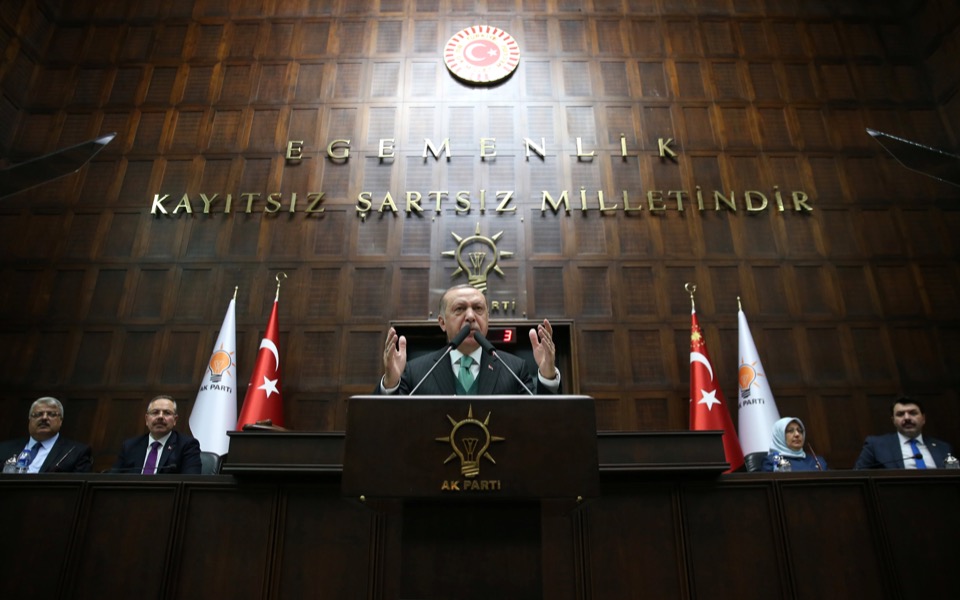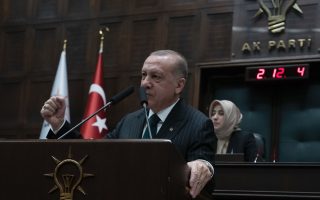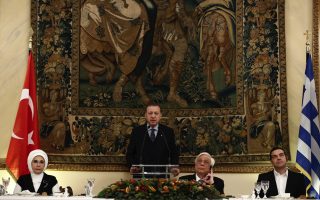Relations with FYROM and Turkey’s influence

We spend a lot of time in Greece discussing, arguing and assigning blame over the name of the Former Yugoslav Republic of Macedonia (FYROM), even though most nations recognized the country as the “Republic of Macedonia” years ago. Continuing this diplomatic dead-end harms us on two fronts.
The first concerns our relationship with our northern Balkan neighbor, which we could have developed into Greece’s closest ally and most natural partner with a smarter and more flexible approach. The second has to do with the role and influence being cultivated by another neighbor, one that really harbors irredentist claims toward Greece and by its rhetoric and behaviour constitutes a threat to our country.
Turkish President Recep Tayyip Erdogan’s public demands for a review of the Treaty of Lausanne, claims by the Kemalist opposition that 18 Greek islands were ceded to Greece in an unacceptable manner and need to be reclaimed, and provocative comments and moves regarding Cyprus’s exclusive economic zone should serve as a stark reminder of Greece’s real challenges.
It is in relation to this neighbor, the one in the east, not to the north, that we should be focusing our attention and investing our diplomatic capital as regards both the Aegean and Cyprus. This is especially so when we consider the difference in military might between the two countries.
Sure, every issue is important and the FYROM name dispute certainly deserves attention and skilled handling. But every country, and especially one the size of Greece, needs to prioritize its challenges and act accordingly.
The longer relations between Athens and Skopje remain on an uneasy footing, the more Turkey is able to increase its influence in the Balkans as part of a policy of that has clear geostrategic aims as well as a religious dimension. Erdogan rarely misses an opportunity to express his support for FYROM’s accession to NATO and has repeatedly accused Greece of acting unfairly in preventing this from happening until the name dispute is settled.
In a number of public speeches, the Turkish president has stated that Turkey and “Macedonia” share a bond of “brotherhood,” that Ankara and Skopje have “no differences,” that the Turks will never “forsake their Macedonian brothers” and that “Turkey is always by Macedonia’s side.” He has even claimed that Ankara will not allow a change in FYROM’s name.
FYROM’s prime minister, Zoran Zaev, is due to visit Turkey next Monday and meet with Erdogan, Prime Minister Binali Yildirim and the speaker of the Grand National Assembly, Ismail Kahraman.
Just a week ago, Erdogan hosted a tripartite meeting with the Serbian president and the Muslim member of the rotating presidency of Bosnia-Herzegovina, where, among other things, he vowed that Turkey would contribute to the construction of a highway linking Belgrade and Sarajevo. The Turkish president has also shown a keen interest in Albania and Kosovo.
Turkey already has a good deal of influence in the Balkans and is now going to great lengths to increase it. The only response that Greece can have to this is to further strengthen its relationship with the Balkan states on a multilateral level – Athens does indeed implement initiatives and uses its role as a member of the European Union and NATO – but also on a bilateral one. In this context, improving ties with FYROM would prove vital to Greece’s interests.





